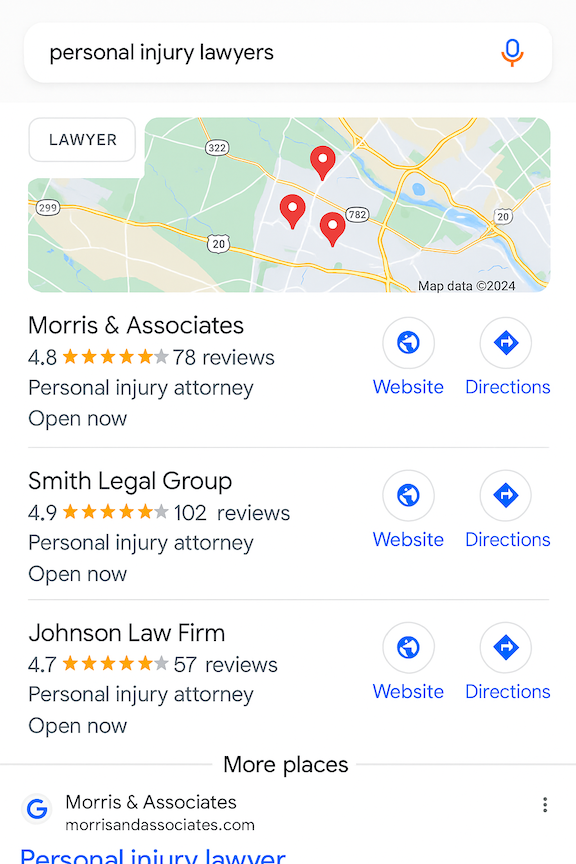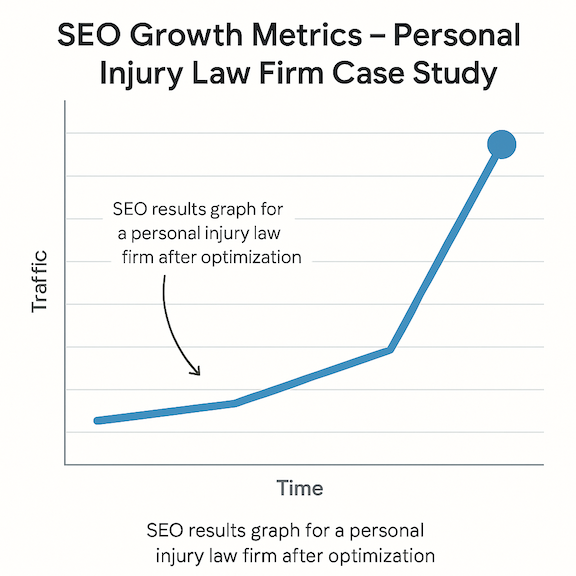When someone searches “personal injury lawyer near me,” are they finding your firm—or your competitor’s?
The truth is, 96% of people seeking legal advice start with a search engine. If you’re not showing up, you’re not just missing traffic—you’re losing clients. For lawyers, especially those in competitive practice areas like personal injury, mastering SEO (Search Engine Optimization) isn’t optional anymore. It’s the single most effective way to build trust, visibility, and a steady pipeline of qualified leads.
In this guide, we break down the SEO strategies that actually move the needle for law firms in 2025—and how your firm can stop getting buried and start getting found.
What Is SEO for Lawyers (And Why Most Firms Get It Wrong)
Legal SEO is the process of optimizing your firm’s website so it ranks higher in search engine results for keywords your prospective clients are searching.
Most law firms fail at SEO because:
- They rely on outdated tactics (like keyword stuffing or boilerplate content)
- They don’t optimize for local search
- They treat SEO as a one-time fix instead of an ongoing strategy
Solution: You need a holistic, modern SEO strategy tailored to how clients search for legal help today.
Local SEO: The Foundation of Legal Visibility

Here’s how to dominate local search:
- Claim and optimize your Google Business Profile
- Add localized keywords and content to your site
- Build citations on legal directories (like Avvo and Justia)
- Get consistent 5-star reviews
Pro Tip: Add photos, business hours, and service areas to your Google profile. It builds trust and increases conversions.
Read our full guide on Local SEO for Lawyers
Content That Attracts—and Converts
You can’t just write “criminal defense lawyer” on a page and expect to rank. Your content needs to:
- Address your ideal client’s questions
- Include long-tail keywords like “how much does a DUI lawyer cost in PA?”
- Provide clear, authoritative information
Problem: Most law firm blogs are vague, generic, or written for other attorneys—not potential clients.
Solution: Write for the client. Better yet, let us write for them. Our legal SEO content converts readers into consultations.
On-Page SEO: Technical Fixes That Boost Rankings
Your site may look great, but if it’s not technically optimized, it won’t rank.
Key elements:
- Proper title tags and meta descriptions
- Mobile optimization and fast page load speed
- Structured data (schema markup)
- Internal linking to key pages like Digital Marketing for Lawyers and Top Digital Marketing Strategies for Law Firms in 2025
Authority & Backlinks: How Google Decides You’re Legit
Backlinks from authoritative sources are one of the most important ranking factors.
Build links from:
- Bar associations and legal publications
- Guest posts on relevant blogs
- Directories like FindLaw
Don’t: Buy backlinks or use spammy link farms. Google will penalize you.
Do: Earn links by publishing helpful, original legal content and promoting it.
Reviews: Your Secret SEO Weapon
Search engines trust what people say about you more than what you say about yourself.
Encourage clients to leave reviews on Google, Yelp, and Avvo. Even one new review a month can significantly impact your local rankings.
Need a process? We help law firms automate the review request process.
Case Study: How We Helped a Personal Injury Law Firm Increase Leads by 312%
A mid-sized personal injury law firm in New Jersey came to us frustrated by poor visibility online. They weren’t showing up in the local map pack and were only ranking for their brand name.
Our SEO Plan Included:
- Local SEO overhaul (GBP optimization + local citations)
- Weekly blog content targeting high-intent questions (e.g., “How long do I have to file a personal injury claim in NJ?”)
- High-quality backlink acquisition through legal industry guest posting
- Site speed and mobile optimization
The Results (After 6 Months):
- 312% increase in organic leads
- 178% increase in local map pack visibility
- Top 3 rankings for 7 high-converting keywords
This wasn’t magic. It was strategy, consistency, and execution.
Choosing the Right SEO Partner
Many agencies promise page-one rankings. Few deliver. Here’s what to look for:
- Case studies from other law firms
- Transparent reporting
- Legal content expertise
At VujaDay Digital, we specialize in SEO for law firms. We know what your clients are searching for—and how to get your site in front of them.
📌 Frequently Asked Questions
Q1: How long does SEO take to work for law firms?
Most law firms start to see meaningful improvements in 3–6 months, especially in local rankings. However, long-term SEO is about compounding growth—the longer you invest, the more visible and dominant your firm becomes.
Q2: Is SEO better than Google Ads for lawyers?
SEO and Google Ads serve different roles. SEO is long-term and builds authority over time, while Google Ads can generate immediate traffic. The best strategy often combines both for maximum visibility.
Q3: Do I need SEO if I already rank for my firm’s name?
Yes—ranking for your name only helps people who already know you. SEO ensures you show up when potential clients search for “personal injury lawyer near me” or “best DUI attorney in [city].”
Q4: What’s the difference between local SEO and traditional SEO?
Local SEO focuses on ranking in map packs and geographic searches, especially important for attorneys serving clients in a specific area. Traditional SEO may target broader or national keywords.
Q5: Can you guarantee first-page rankings?
No ethical agency can promise guaranteed rankings. What we offer is a proven process built on data, content, technical expertise, and continual optimization—results, not gimmicks.
Q6: What makes your agency different from other legal marketing firms?
At VujaDay, we specialize in results-driven marketing for law firms. We don’t use templates or cookie-cutter tactics. Everything we do—from content to local SEO to technical fixes—is customized to help you dominate your market.
Conclusion: Your Competitors Are Doing This Already
SEO isn’t the future of legal marketing. It’s the present. And every day you wait is a day your competitors outrank you.
Let’s change that.




